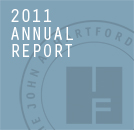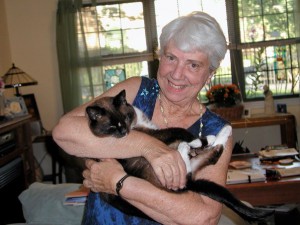 As our dedicated 2012 Hartford Foundation annual report blog series followers know, our August 7 blog featured the creative team behind our award-winning annual report. Intrigued by their stories, we asked our annual report writer, Lynne Christensen, to tell us more about her experience writing about mental health and older adults.
As our dedicated 2012 Hartford Foundation annual report blog series followers know, our August 7 blog featured the creative team behind our award-winning annual report. Intrigued by their stories, we asked our annual report writer, Lynne Christensen, to tell us more about her experience writing about mental health and older adults.
Writing this year's annual report had personal significance for me that I could not have anticipated when I began the project. About halfway through the writing process, I learned that my 81-year-old mother needed a heart valve replacement, and the surgery couldn't wait. It was a traumatic surgery for someone her age.
 Alice Christensen and her beloved cat, Sugar
Alice Christensen and her beloved cat, SugarWhen the doctor showed up in the waiting room after the surgery and said it went fine, I shed a few tears of relief. I knew there would be a long physical recovery, but no one prepared us for the impact this type of surgery would have on her mental health. The ensuing depression was deep and profound. I was alarmed when my mother said to me several times in the days after the surgery that she shouldn't have survived the surgery. She'd be better off dead. Nothing I said seemed to help. I spoke to a social worker in the hospital who said that this was to be expected, and that many people become depressed after heart surgery.
It was difficult to manage my mother's pain, and the depression was too easily attributed to pain. I visited my mother every day that she was in the hospital, but she was alone at night. One day she told me that the previous night she was so depressed she began to weep uncontrollably. A nurse came by to check on her. The nurse asked if she were in pain. My mother said no and just kept crying. The nurse ignored the tears and rather curtly told her to let her know if she needed pain medication, then left. The very least my mother needed in that moment was a kind word.
Ten days after the surgery, my mother was released to a rehabilitation facility for another ten days. She dutifully went through physical and occupational therapy. The depression had not abated. When my brother and I arrived to take her home a psychologist showed up. She asked a bunch of questions, including questions about how my mother was sleeping. She was sleeping terribly. She was still having pain and depression. The psychologist recommended a sleep study. When I pressed her about the depression, she said that was to be expected. It often happens to people after heart surgery.
My mother said to me, "We may be old but we have feelings, and it gets harder as you get older." She said no one prepared her for how difficult the rehabilitation would be, including on her mental health. In fact, all the health care professionals she saw minimized it. Her surgeon told her she'd be recovered in 4 weeks. After the surgery, doctors and other health care providers kept saying, "You look great, Alice." She hated hearing that because she felt like she had to live up to it. In fact, every time she heard that she wanted to say (but didn't), "I feel like crap." They rarely asked how she was feeling.
I cared for my mother at home for the next two weeks. A nurse and a physical therapist regularly came to the house. I asked the nurse if there was a social worker or some other mental health professional to help with the depression. She said that depression is to be expected after such a major surgery.
About two months after the surgery, my mother was able to drive and get around reasonably well, so her doctor sent her for outpatient cardiac rehabilitation. She arrived for the intake and they immediately detected the depression and sent her to a social worker. Finally, an entity had a process in place to deal appropriately with depression! The social worker put my mother on medication and arranged counseling sessions. I was so relieved when she called and told me how helpful it was for her just to talk to the social worker.
Writing the Policy section of the annual report had particular meaning for me because of this experience. This section features Hartford-funded scholars who are working to improve recognition and treatment of depression in older adults receiving home care.
When I interviewed Dr. Zvi Gellis, he talked about his research on depression in older adults receiving home care. He said,
Through anecdotal and focus group research with home healthcare staff, we found that [although] they recognized that older persons have some depressive symptoms or anxiety, [they] said, ‘We don’t really know what to do. We don’t want to open up the Pandora’s box because we’re afraid that someone may say, yes, I’m depressed and I’m going to kill myself.’ Then they don’t know what to do about it, because they’re not trained in … mental health protocols, or in counseling, or even in assessment to some extent.
I can attest that just telling someone "Depression is to be expected after major surgery" is not all that helpful. Here’s what I would like others to know about older adults and mental health issues:
- Don’t assume that depression is to be expected in older adults. If you detect and treat it, you may change a person’s life.
- Don’t assume that psychotic disorders like schizophrenia and bipolar disorder stay the same or get worse with age. In fact, they may get better.
- Don’t assume that an older adult who has a change of mental status must have dementia. It might be delirium, which can be treated.
- Don’t assume that you can’t do much for older adults with mental health issues. In fact, there is quite a bit that can and should be done.
I was amazed and honored by the people who allowed us into their homes and into their lives to share very personal stories about their struggles with depression, bipolar disorder, schizophrenia, complicated grief, and delirium. They told their often difficult stories without hesitation, and all of them said they did it because they hoped in some way it might help others. I share their hope, and ask that everyone reading this blog share the annual report with others.
